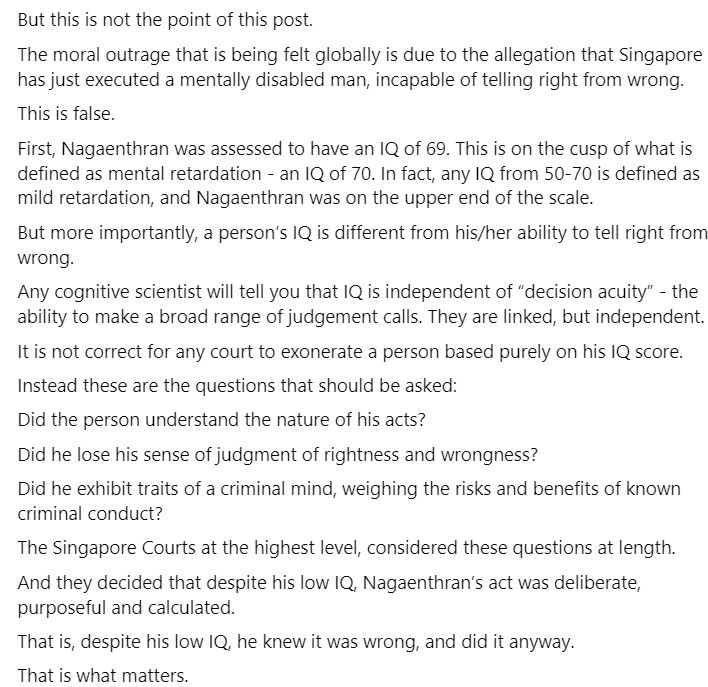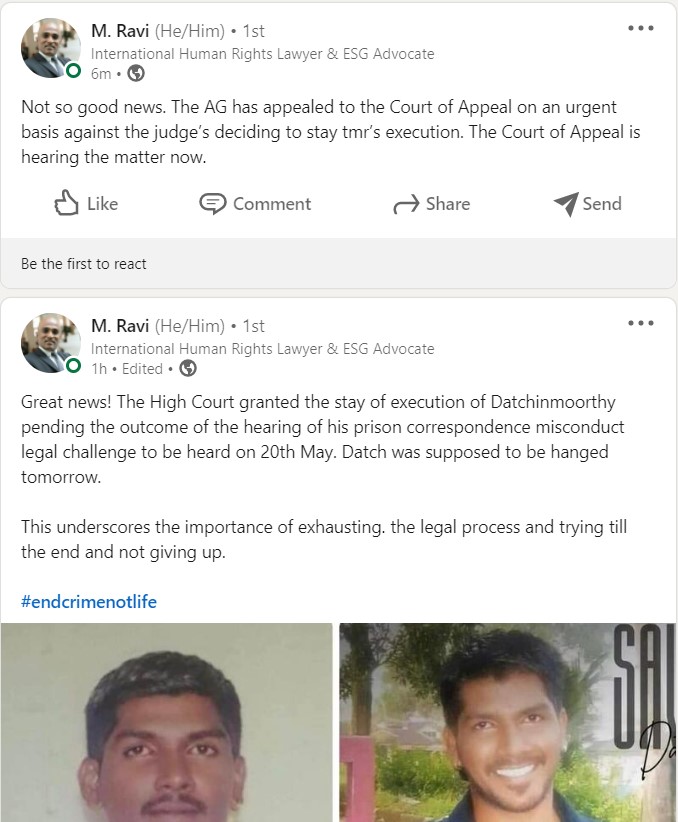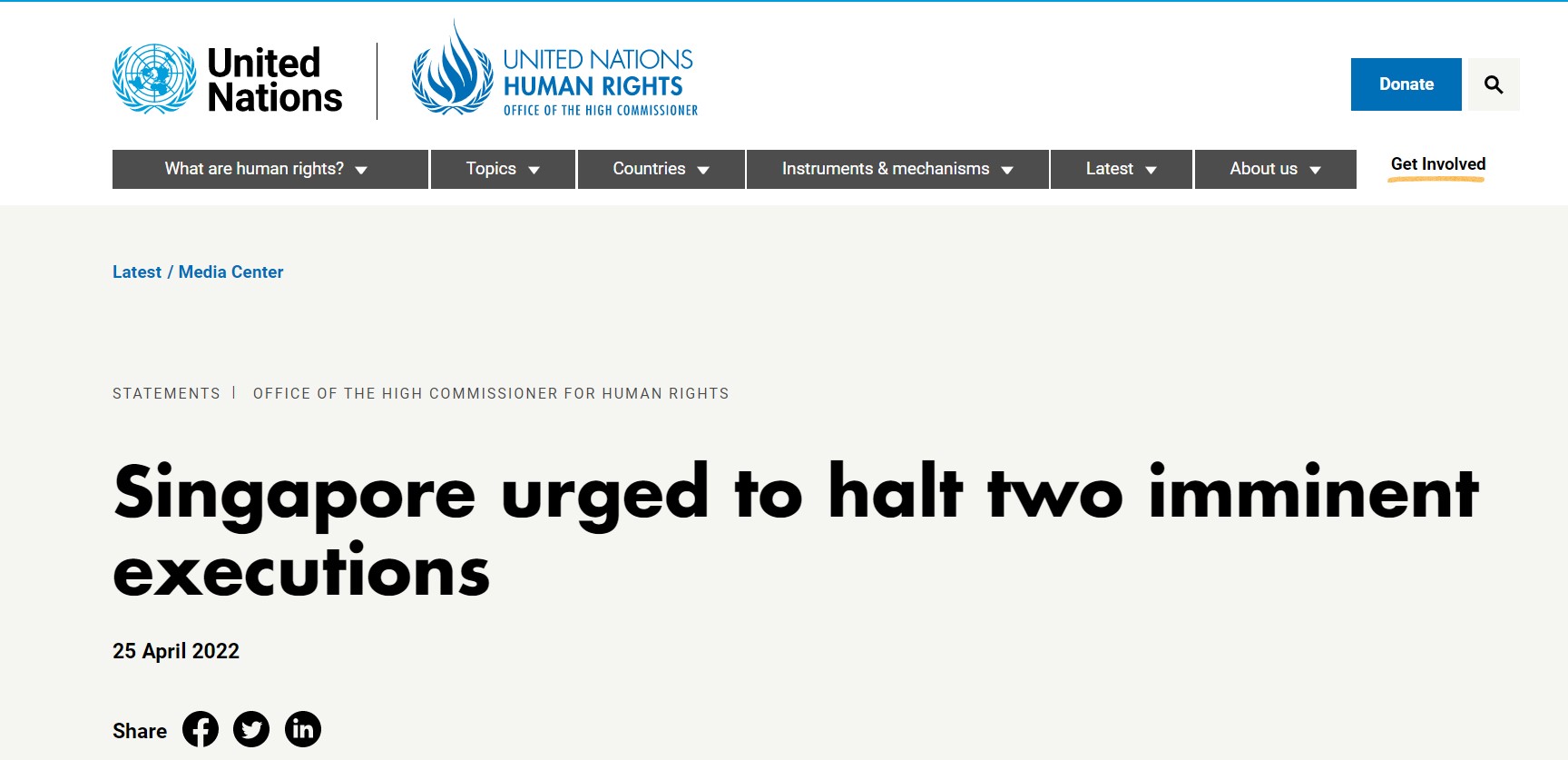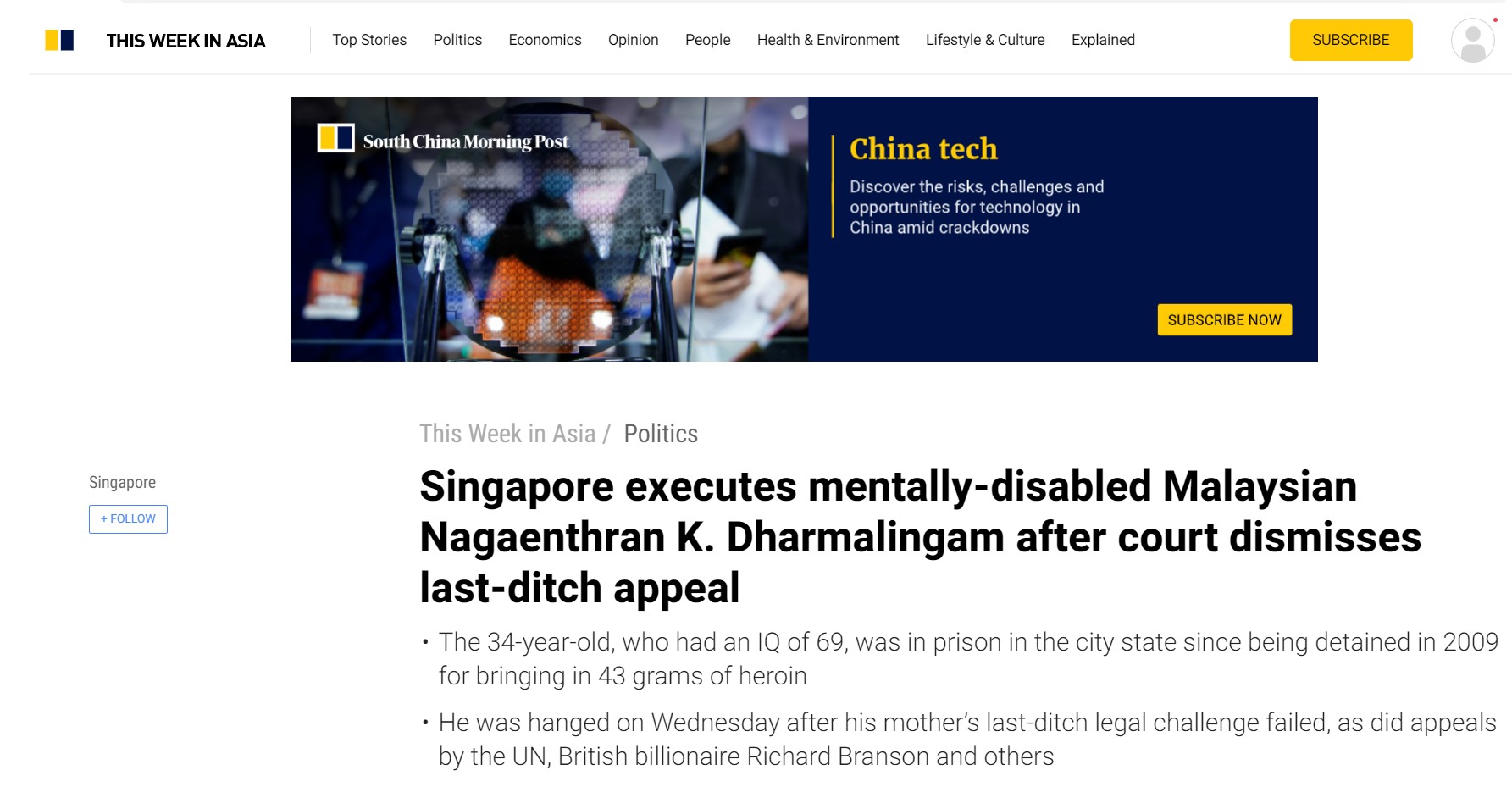Opinion Piece by Tang Li
We’ve finally done it. On the morning of 27 April 2022, Mr Nagaenthran K. Dharmalingam, a Malaysian Tamil who was caught with drugs in his possession, was hanged after a decade on death row. Mr Dharmalingam’s fate was never in doubt. Despite the valiant efforts of his lawyer, Mr M. Ravi and activist like Ms Kirstin Han, the only thing that kept Mr Dharmalingam alive from November 2021 onwards, was Covid-19.
Despite international pressure and appeals from the likes of the United Nations Human Rights Office and Sir Richard Branson, countless postings on social media, letters to everyone outside of Singapore and numerous vigils, the Singapore Government was resolute and hanged Mr Dharmalingam.
The government, which normally enjoys basking in the praise of the international media, has had to take a few brickbats like the following from the South China Morning Post:
This is nothing new when it comes to capital cases. Singapore proudly tells the world that it has a “zero-tolerance” policy when it comes to drugs and that is a policy that has made Singapore the nice, safe, green and clean metropolis that the world looks to with envy.
This argument is best encapsulated by a Malaysian businessman I know who called us “Disneyland Under Martial Law.” We all want to live in Disneyland, but we accept certain unsavoury things about the place because that’s how Disneyland manages to be Disneyland.
The government has milked this image for everything that it’s worth. For example, whenever, a Westerner ends up on the wrong end of our more draconian policies, there’s always a diplomatic row. The end result is that we end up popular with large segments in the West (people saying that their respective nations need to learn from the West) and the government does look like it is standing up to the Western world.
The activist can make a lot of noise, but at the end of the day, the government always points to the fact that the death penalty has plenty of support. The undisputed fact that Mr Dharmalingam’s IQ is 69 (below average) didn’t matter to our government.
As far as they were concerned, Mr Dharmalingam was an evil mastermind causing the downfall of Singapore by providing people with drugs. One only has to look at the Facebook page of former Nominated Member of Parliament, Mr Calvin Cheng Facebook page to get a gist of the defence of hanging Mr Dharmalingam:

There is, however, one question that needs to be asked. Are we, as a society, so eager to “uphold” the law that we end up breaking it? Are we really combating the scourge of drugs, or are we merely waging a war on poor people?
I’ve argued in my November 2021 piece “DRUG DEALING 101” that the statistics do not support the argument that hanging is a major deterrent. While the number of arrests for drug abuse remains relatively low on the global scale, the figure has remained fairly constant, which would indicate that despite the obvious risk, people are still using drugs, which means that drugs are still getting into Singapore.
Why do people still carry drugs despite the obvious penalty they face? Contrary to what Mr Cheng suggests, the real problem is poverty rather than “morals.” It’s been argued by the likes of Mr Cheng that while slow, Mr Dharmalingam had the capacity to tell right from wrong, hence he deserved it for breaking the law.
The question we should have asked was – was he able to choose between the lesser evil or the greater good. In this case, he was at risk of getting hanged for getting drugs into Singapore or having no money to help his family.
Would I do it? The answer is no. I have enough wits about me to understand that getting hanged is not worth the price. I am healthy and witty enough to get a source of income. My IQ is above 100. My circumstances are as far away from Mr Dharmalingam’s as possible.
If one looks at who is sitting on death row, one will notice that the demographics are obvious. You are looking at Malaysian Tamils, who have the highest representation in what you could call the “Ghetto Class,” or more crudely put – the class that nobody gives a s*** about.
The Powers That Be in just about every country on the planet have realised that if you belong to the class that nobody gives a s*** about, they can do pretty much what they want to do with you.
That is precisely the point that Black Lives Matter protestors were trying to make in 2020. Blacks get brutalised by the police because, well, if you ask enough people in White suburbia, they pretty much deserved it. The same is true for many Malaysian Tamils.
In the case of Mr Datchinamurthy a/l Kataiah (“Datchi”), unlike Mr Dharmalingam, Mr Datchi is not slow. If anything, knowing his rights is the problem as far as the state is concerned.
It was found that the prison service was passing privileged correspondences between him and his lawyer to the Attorney-General’s Chambers (AGC). One doesn’t need a law degree to know that this is legally incorrect. It’s a violation of privilege.
Mr Datchi launched a legal challenge (which is within his rights) and the date for that hearing is 20 May 2022.
Nobody is disputing that Mr Datchi was caught with the offending drugs. What is being challenged is the way in which the state has trampled on his rights. One would expect that while Mr Datchi is probably prepared to be hanged, he’s also going to try and buy more time and if his basic rights have been violated, he should use that.
At the time of writing, the judge has granted a stay of execution until his legal challenge can be heard. However, the Attorney-General is pushing for an urgent appeal. Why is the AGC in such haste to execute him? Time is on their side.

Have we reached a stage where we are telling ourselves that all of society’s problems are due to “poor people?” There is no evidence to suggest that executing Mr Dharmalingam and Mr Datchi would stop the drug trade.
It is apparently not important that Mr Dharmalingam’s less than average IQ was a matter of consideration, or that the AGC and Prison Service had committed a violation of Mr Datchi’s rights. The law is in the favour of the state, and the state has effectively won this fight. So, why is the state in such haste to get rid of people like Mr Dharmalingam and Mr Datchi?
Would the state be as eager to wipe them from the face of this earth if they were from any other social class except the one, they are from? When six law students got caught cheating in the bar exam, the initial reaction from the authorities was to give them a “second chance” and their names were initially kept out of the public eye. Would the state be so keen to give “second chances” if they were from the class that nobody gives a s*** about?
I’m not saying that drugs are not a problem. I am not even talking about the legalities or moralities of the death penalty. I just believe that we need to ask ourselves if we are really at war with drugs and poverty, or if we’re merely at war with poor people for being poor.
This is the question that needs to be asked if we are serious about dealing with the social problems we claim that we want to solve.
A version of this article first appeared at beautifullyincoherent.blogspot.com



